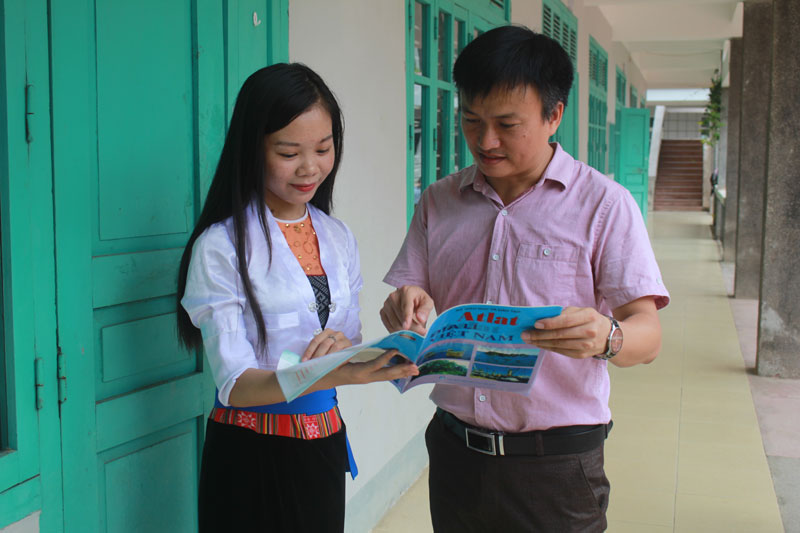
(HBO) – The one we want to talk about is Ha Hai Yen, a student of class 12B (2014 – 2017 term) at the Ethnic Boarding School of Hoa Binh province. She was the monitor for three years at the high school with outstanding academic achievements.
Ha Hai Yen, student of class 12B (2014 – 2017
term) at the
Ethnic
Boarding School of Hoa
Binh province, has always set a good example in all activities at school.
Yen is the oldest child in a family with two
girls in Bach 2 hamlet, Lung Van commune, Tan Lac district. Her mother is a
teacher at Lung Van primary and junior high school, and her father works at
Quyet Chien primary and junior high school. Yen had to stay with her grandparents,
away from her home when she went to the first grade at the primary school in
Dich Giao commune. Then, she studied at the Ethnic Boarding School of Tan Lac
district. At the school, she learnt about and nurture her dream of studying at the
Ethnic Boarding School of Hoa Binh province, where President Ho Chi Minh visited.
She tried her best and passed an entrance exam in 2014. With 39.25 points, she
ranked second in the class for gifted students in literature.
With the motto "Keep trying the best, never
regret”, she was an excellent students for all three senior high-school years with
the point average of 8.5 and above in all six semesters. Being selected for the
school’s gifted team in geography, Yen studied hard and won first and second
prizes at the provincial contests for gifted students in geography at Grades 11
and 12, respectively.
She was honoured for her outstanding academic
achievements by the provincial Department of Education and Training twice. At
the high school graduation examination, she scored 31 (including bonus point) and
was admitted into the Orientalism Faculty of the University of Social Sciences
and Humanities, in which she scored
10 in geography. "Now I have a chance to
realise my dream of getting a scholarship to
Japan”, Yen said excitingly.
She underlined the need for self-study, saying
that she listened carefully to her teachers at schools, and studied from 7 – 11
pm and woke up at 5am to study at home.
Yen also actively joined extracurricular
activities at schools. She helped two friends, who had no good academic
performance in her class, improve in their studies and be admitted into
universities.
According to Yen, she gained life skills and confidence
from collective
The Department of Education and Training of Hoa Binh province held a conference on March 18 to review the performance of the "Safe and Happy School" Project and set out tasks for 2025. The project, funded by the Taiwan Fund for Children and Families (TFCF), aims to create a safe, inclusive, and supportive learning environment for students. The event saw the attendance of representatives from the TFCF and 26 beneficiary schools.
With over 70% of their workers being women, trade unions across industrial parks (IPs) in Hoa Binh have been actively safeguarding their legal rights and interests while implementing initiatives to improve their income and well-being.
In recent years, the Hoa Binh provincial General Hospital has continuously innovated itself and improved the quality of medical services to meet the increasing needs of local people. With substantial investments in infrastructure and modern equipment, along with a team of highly qualified doctors and nurses, the hospital has gradually established itself as one of the leading medical units in the Northwestern region and a trusted destination for healthcare for people inside and outside the province.
From mastering the fundamentals of programming to achieving national recognition, the Programming Club of the Le Van Tam Primary School (STAR LVT28) in Hoa Binh city has made remarkable strides in the field of robotics.
The Ho Chi Minh Communist Youth Union Committee and the Vietnam Youth Federation chapter of Hoa Binh province organised a programme on March 12 to launch the "Digital Literacy" movement and an online quiz on the resolutions of the Vietnam Youth Federation congresses at all levels, as well as the Politburo's Resolution No. 57-NQ/TW on breakthroughs in the development of science, technology, innovation, and national digital transformation.
As climate change grows more unpredictable, the development of production forests has become essential - not just for economic growth, but for safeguarding the environment and maintaining ecosystem balance. By boosting local incomes, curbing natural disasters, preventing soil erosion, and protecting water resources, these forests play a crucial role in sustainable development.



